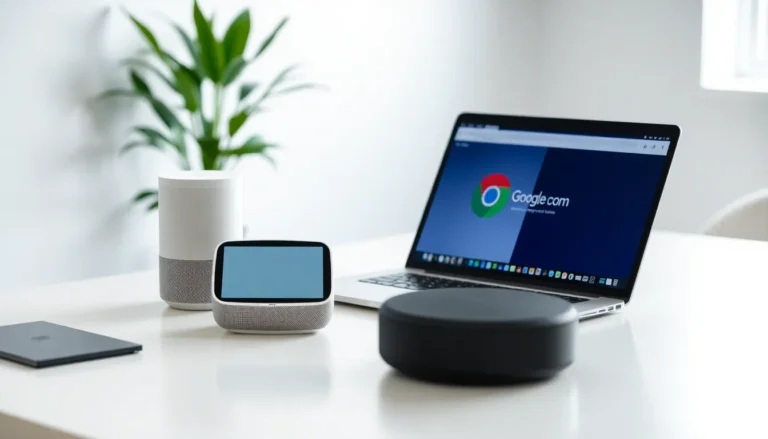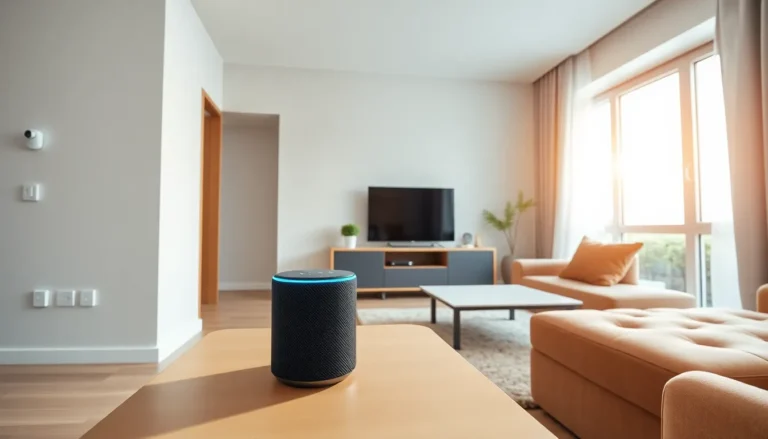Table of Contents
ToggleIn a world where energy bills seem to rise faster than a cat on a hot tin roof, home energy management has become the superhero we never knew we needed. Imagine having the power to control your energy consumption with just a few clicks—no capes required. With the right tools and strategies, homeowners can slash their energy costs while saving the planet one light bulb at a time.
Home energy management isn’t just about saving a few bucks; it’s about creating a more efficient and sustainable living environment. From smart devices that know when to dim the lights to energy audits that reveal hidden savings, the possibilities are endless. It’s time to take charge of your energy use, boost your home’s efficiency, and maybe even impress the neighbors with your eco-friendly prowess. Who knew saving energy could be this much fun?
Overview of Home Energy Management
Home energy management focuses on optimizing energy use in residential settings. Effective management reduces energy expenditures while improving efficiency. Homeowners can utilize smart devices, such as thermostats and smart plugs, to monitor and control consumption in real-time. These tools provide valuable data that guides more informed decisions about energy usage.
Energy audits offer another effective method for identifying wasteful practices. Through audits, homeowners receive recommendations tailored to their specific needs, ensuring targeted solutions. Additionally, sustainable practices like sealing leaks and upgrading insulation lead to significant energy savings.
Monitoring systems track consumption patterns, helping identify peak usage times. Reducing energy during these periods can lower utility bills. Grid integration allows homes to interact with energy providers, enabling participation in demand response programs. Such programs reward homeowners for reducing consumption during high-demand times.
Implementing renewable energy sources, like solar panels, enhances energy independence. Homeowners can generate their electricity, decreasing reliance on the grid. The combination of smart technology, energy audits, and renewable energy creates a comprehensive approach to home energy management.
Sustainability plays a crucial role in this management strategy. Adopting eco-friendly practices contributes to global efforts against climate change. By controlling energy use, residents not only save money but also make a positive environmental impact.
Ultimately, home energy management empowers homeowners to take charge of their energy consumption. Engaging with various tools and techniques fosters both financial savings and a sustainable lifestyle.
Benefits of Home Energy Management
Home energy management offers numerous advantages, making it an essential aspect for today’s homeowners. Two key benefits include cost savings and environmental impact.
Cost Savings
Cost savings represent a primary advantage of effective home energy management. Homeowners can reduce monthly utility bills by optimizing energy use. Smart devices, such as programmable thermostats, enable precise control over heating and cooling, contributing to significant savings. Energy audits identify inefficiencies, allowing households to correct wasteful practices and save further. Participation in demand response programs often provides financial incentives for reduced energy consumption during peak hours. Overall, implementing these strategies leads to enhanced financial well-being.
Environmental Impact
The environmental impact of home energy management plays a vital role in fostering sustainability. Every kilowatt-hour saved contributes to lower greenhouse gas emissions. By utilizing renewable energy sources like solar panels, homeowners can further decrease their carbon footprint. Monitoring energy usage patterns helps identify opportunities for sustainable practices. Smart home technology ensures better energy efficiency and reduced reliance on non-renewable resources. Overall, this approach supports global climate goals while empowering individuals to take responsibility for their environmental impact.
Key Components of Home Energy Management Systems
Home energy management systems consist of several essential components that enhance energy efficiency and control. These tools empower homeowners to optimize energy use effectively.
Smart Meters
Smart meters provide real-time data on energy consumption. Homeowners receive detailed insights into usage patterns, enabling informed decisions. These devices facilitate two-way communication between the home and utility providers, allowing for efficient billing practices. They can also support dynamic pricing, where rates fluctuate based on demand. Adoption of smart meters often leads to significant reductions in energy costs.
Energy Monitoring Devices
Energy monitoring devices track specific energy usage for individual appliances or circuits. Homeowners can identify energy hogs and adjust habits accordingly. These devices typically connect to a smartphone app, offering easy access to consumption data. The visual representation of energy use over time aids in understanding trends and making behavioral changes. Regular use of energy monitoring devices contributes to long-term savings and promotes efficient energy habits.
Strategies for Effective Home Energy Management
Effective home energy management revolves around key strategies that maximize efficiency and minimize costs. Homeowners can adopt various methods to achieve significant improvements.
Energy Efficiency Improvements
Energy-efficient appliances play a pivotal role in reducing energy consumption. Replacing outdated units with ENERGY STAR-rated models can lead to considerable savings. Insulation upgrades also enhance thermal performance, keeping homes comfortable without excessive heating or cooling. Sealing air leaks prevents unwanted drafts, optimizing HVAC systems. Installing smart thermostats allows for automated temperature adjustments based on occupancy patterns. These improvements collectively contribute to lower utility bills and a reduced environmental footprint.
Behavioral Changes
Behavioral changes in daily routines can lead to substantial energy savings. Simple actions like turning off lights in unoccupied rooms directly lower consumption. Unplugging chargers and appliances when not in use reduces phantom loads. Setting timers or using programmable devices helps manage energy use effectively. Encouraging the family to adopt energy-conscious habits fosters a collective responsibility. Adjusting thermostat settings by a few degrees can also lead to notable savings on heating and cooling costs. Each small change builds toward more efficient energy management practices.
Challenges in Home Energy Management
Home energy management faces several obstacles that can impede its effectiveness. One significant challenge involves the initial cost of implementing smart technology. Investment in smart devices and energy monitoring systems can be substantial, deterring some homeowners from making the switch.
Another barrier is the complexity of technology. Many users struggle to navigate advanced home energy management systems, leading to underutilization. Without proper understanding, homeowners miss out on optimizing their energy usage and savings.
Data privacy concerns also pose a challenge. Consumers often hesitate to adopt smart meters or connected devices due to fears of data breaches or misuse. This hesitation can slow the overall adoption of beneficial technologies in home energy management.
Further complicating matters, inconsistent energy prices create uncertainty. Fluctuating rates can make it difficult for homeowners to predict savings or plan their budgets effectively. Uncertainty surrounding electricity costs discourages engagement in energy-saving programs.
The lack of standardization in energy management technology presents another challenge. Various systems and devices often do not integrate smoothly, creating confusion for consumers. A seamless user experience is crucial for maximizing energy efficiencies.
Lastly, behavioral inertia inhibits change. Many homeowners find it challenging to modify established habits, even when aware of the benefits of energy management. Altering longstanding lifestyles requires effort and commitment, which can deter participation.
Addressing these challenges effectively can significantly enhance home energy management strategies, leading to improved efficiency, reduced costs, and greater sustainability.
Home energy management offers homeowners a powerful way to take control of their energy consumption. By embracing smart devices and implementing energy-efficient practices, they can achieve significant cost savings while contributing to a more sustainable future. The integration of renewable energy sources further enhances this journey towards energy independence.
As they navigate the challenges of adopting new technologies and changing habits, homeowners can unlock the full potential of their energy management systems. This proactive approach not only leads to lower utility bills but also plays a vital role in reducing environmental impact. Ultimately, effective home energy management is a rewarding endeavor that empowers individuals to make informed choices for their homes and the planet.







